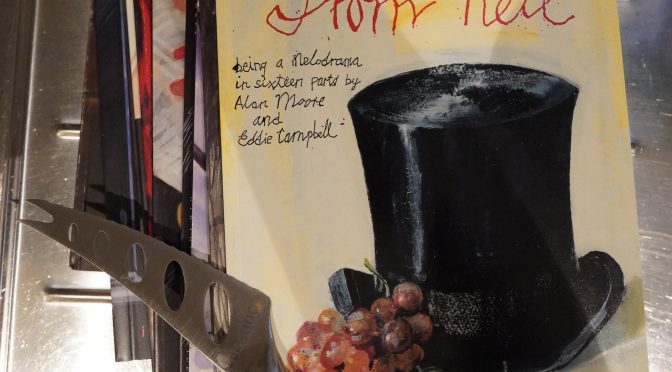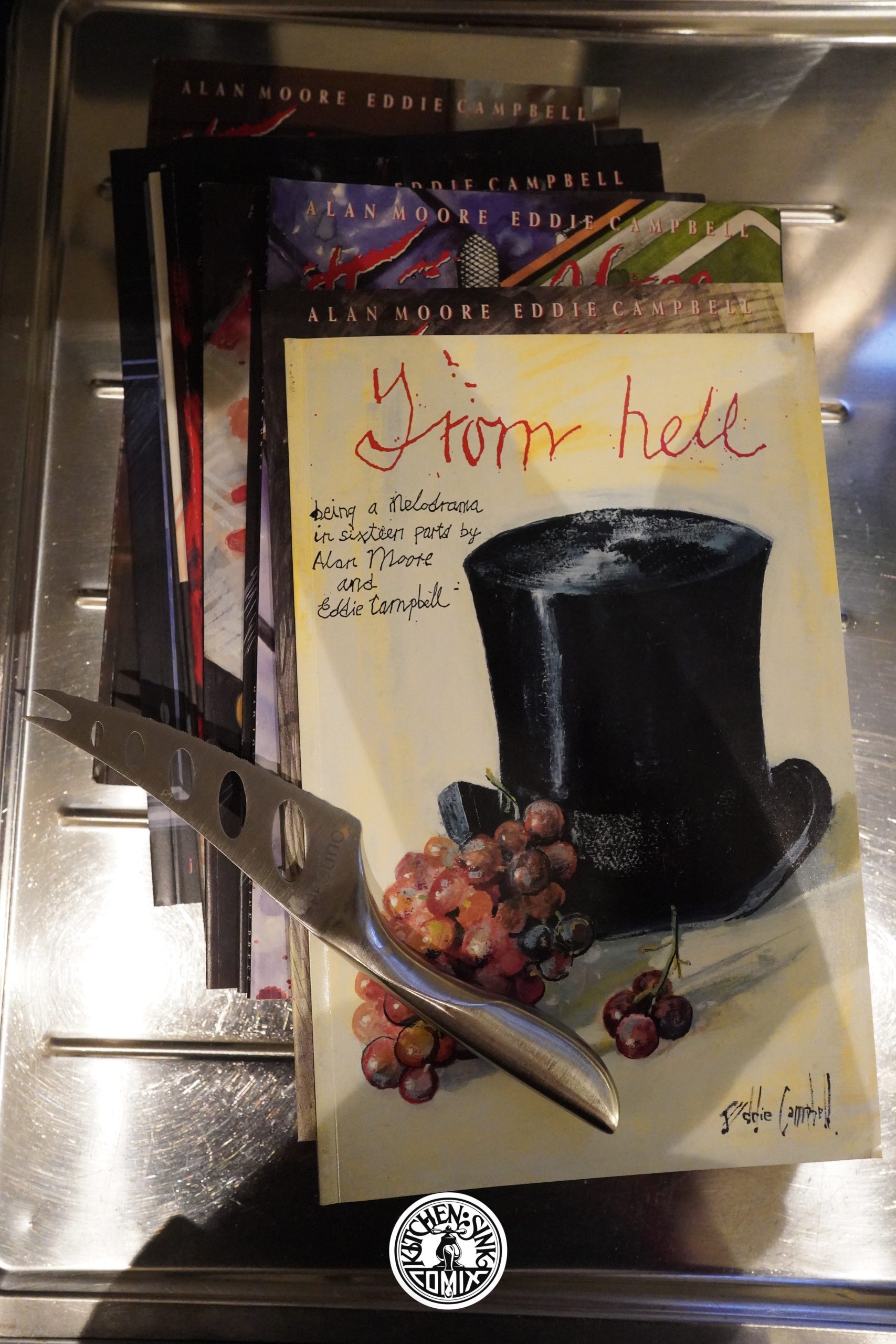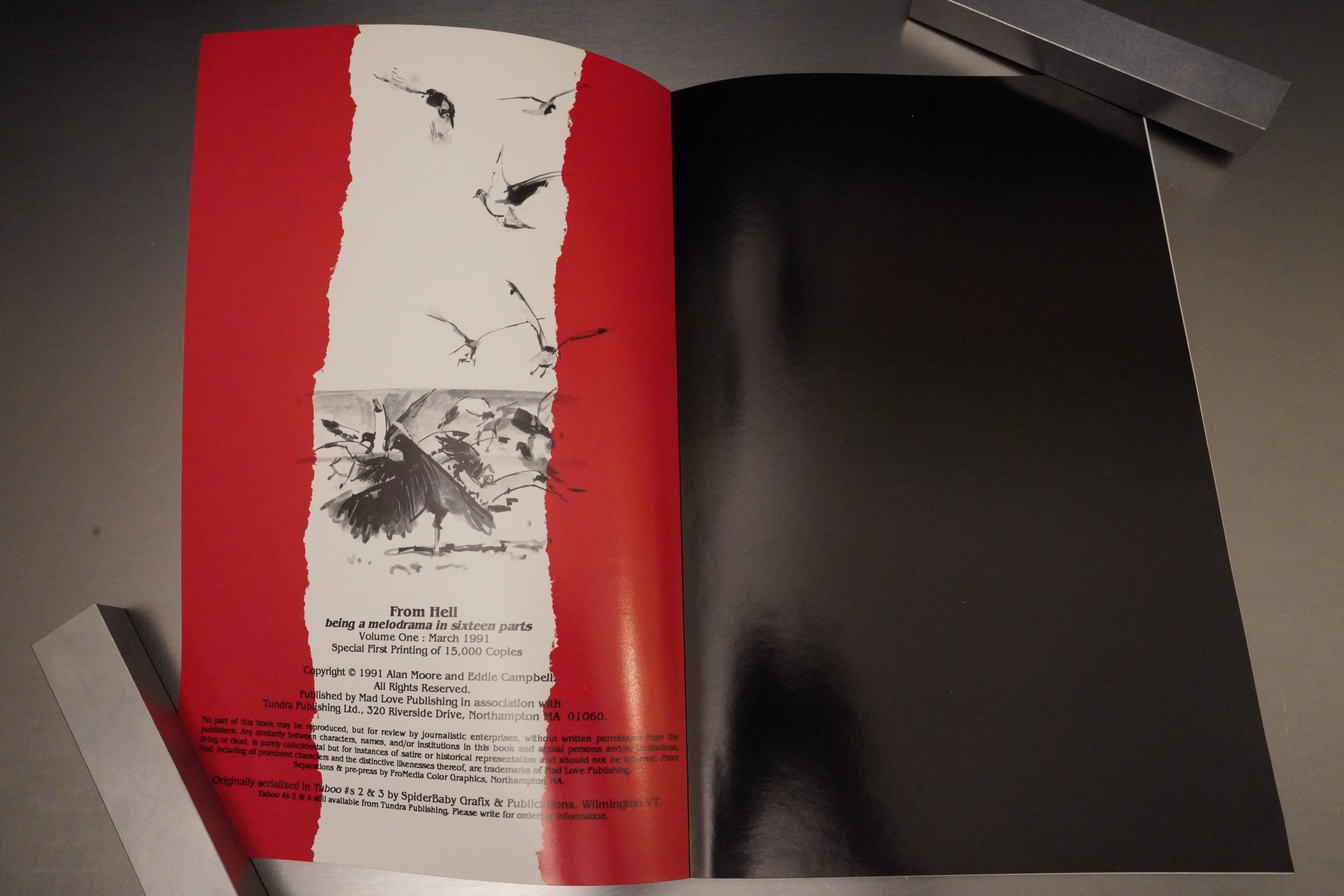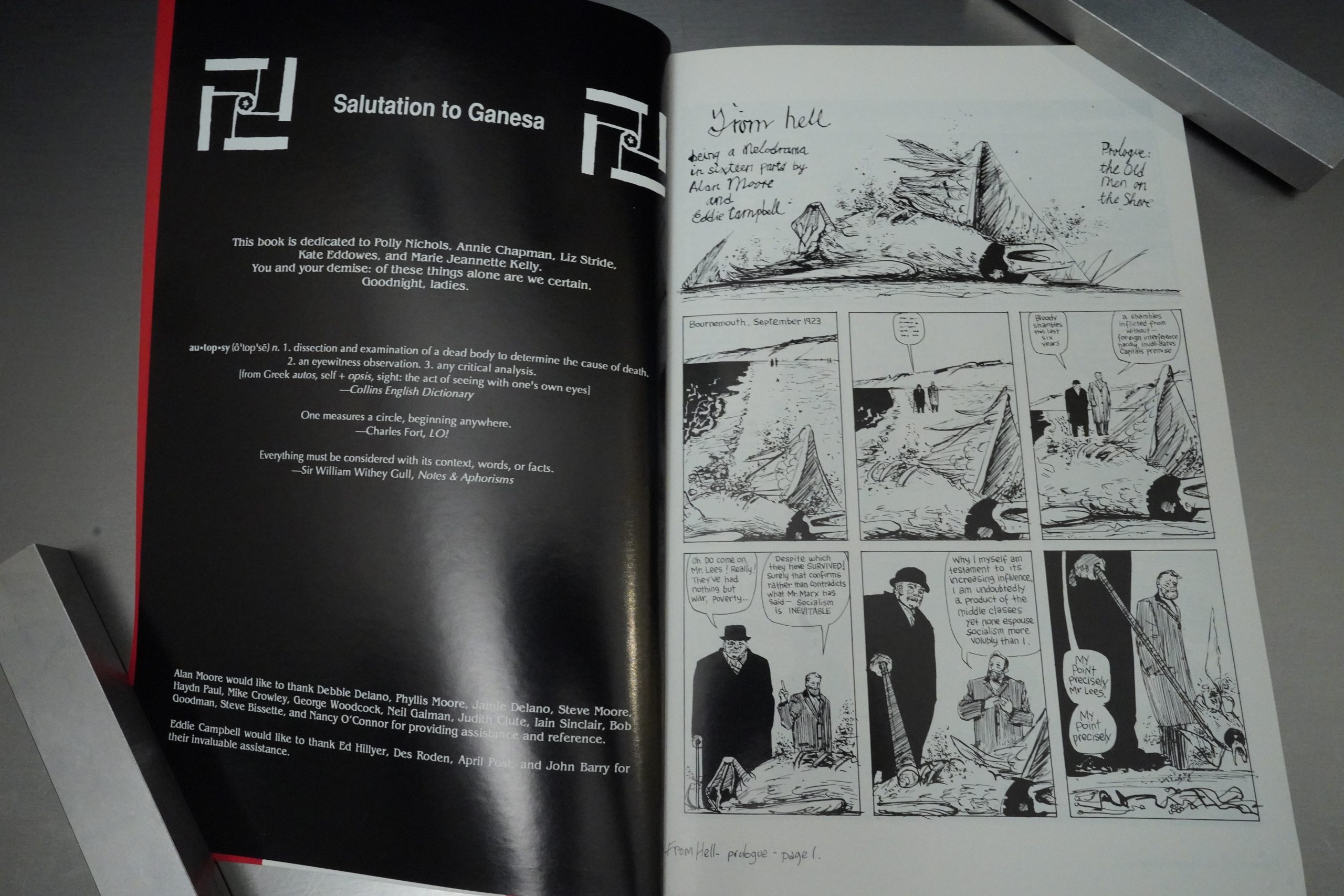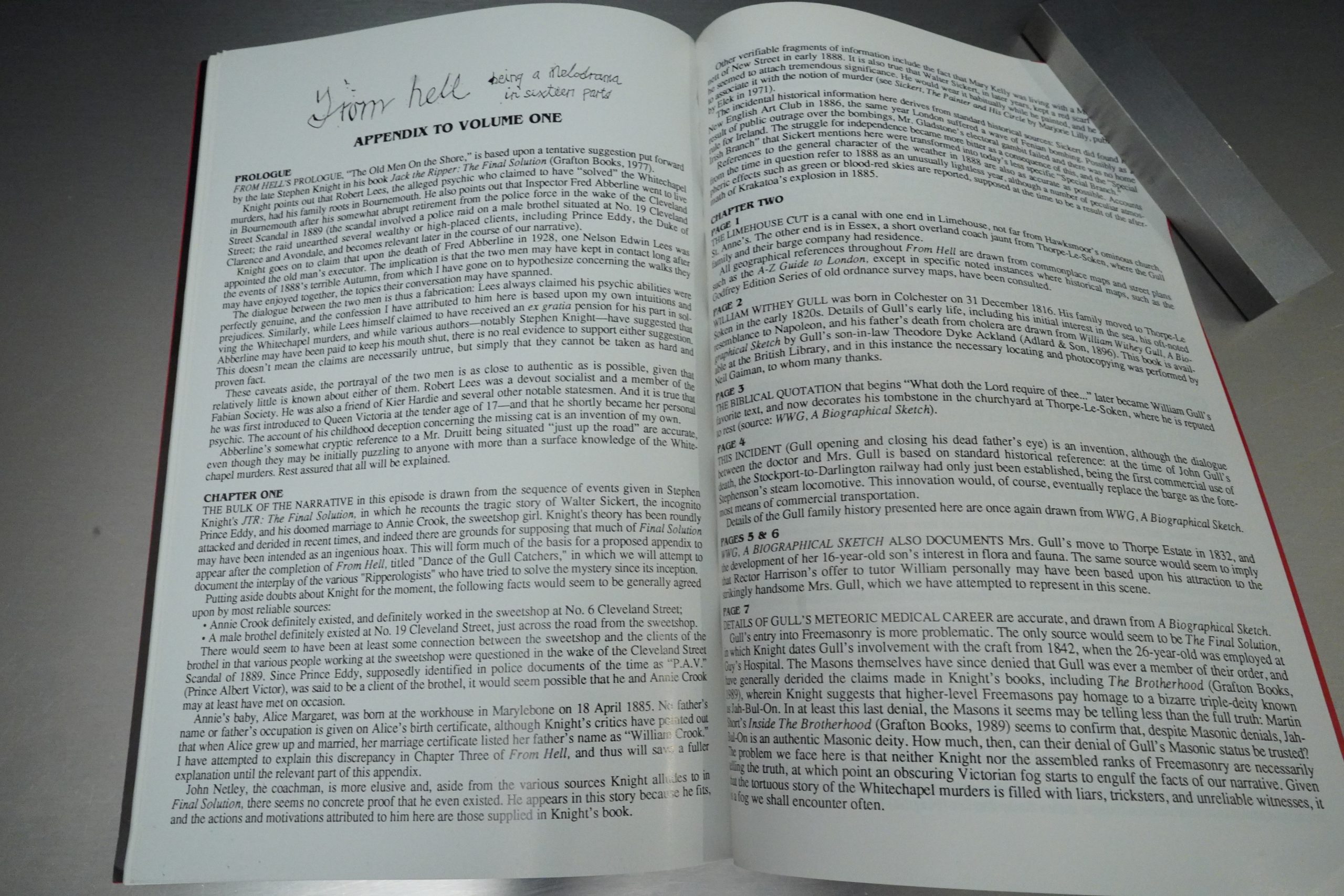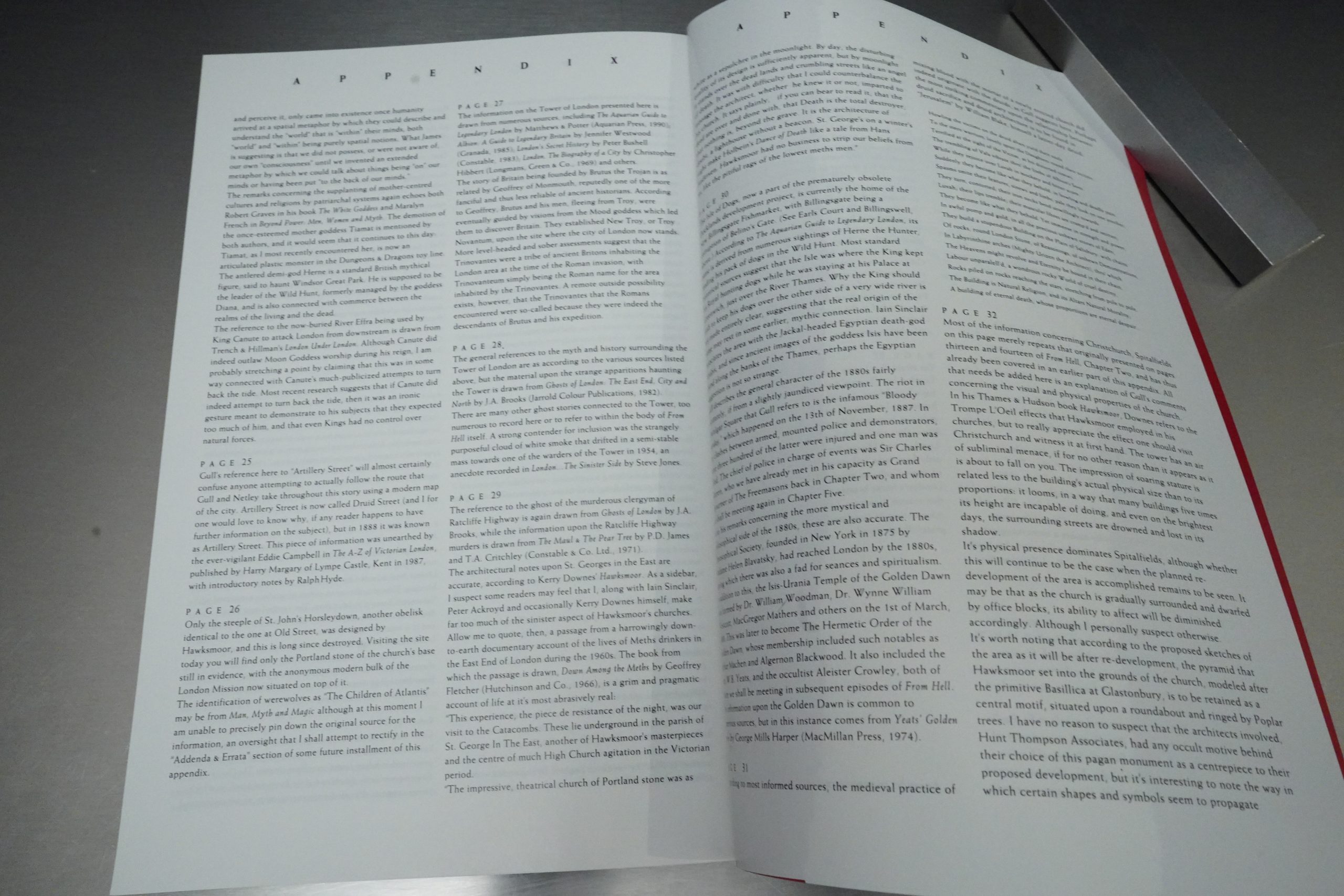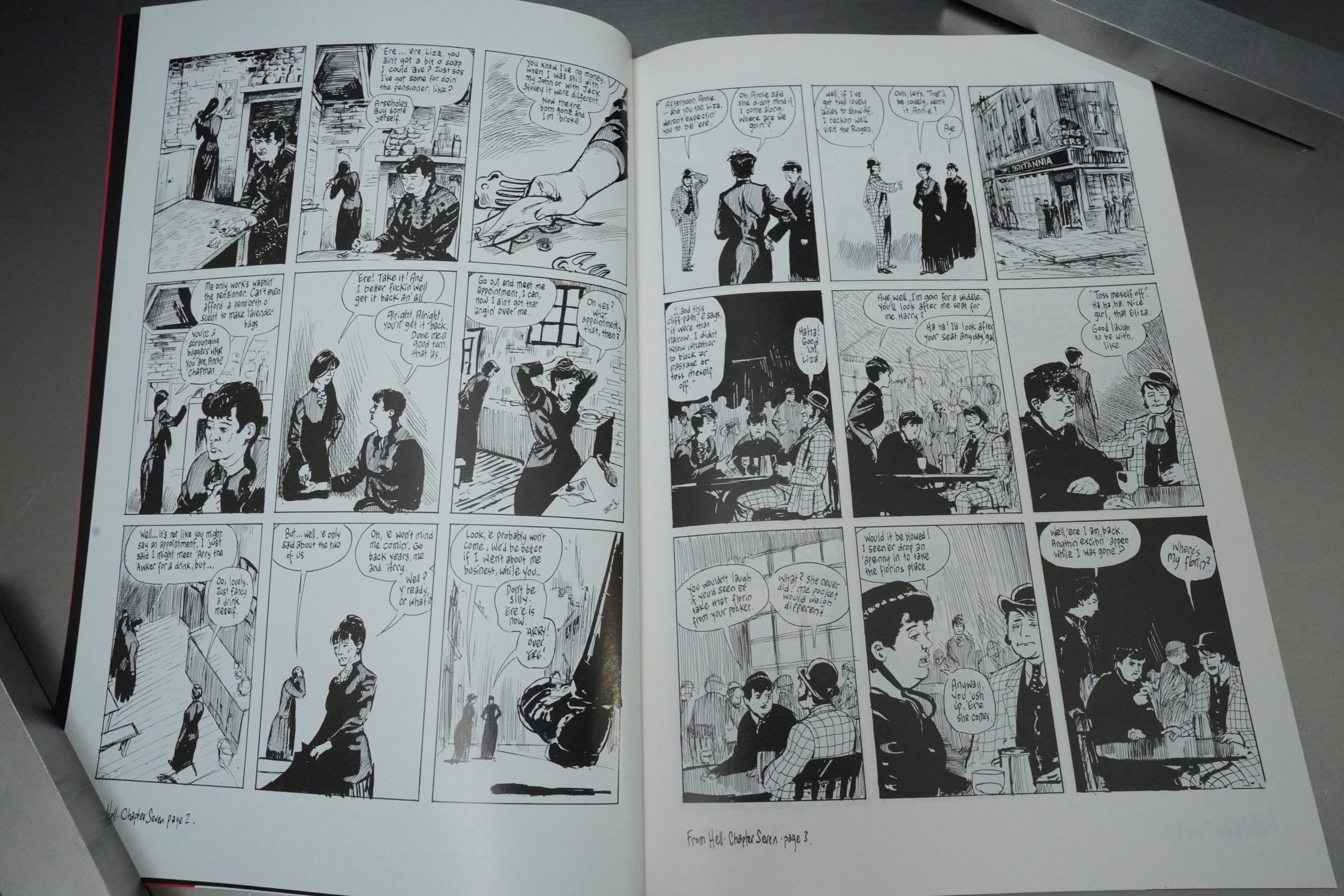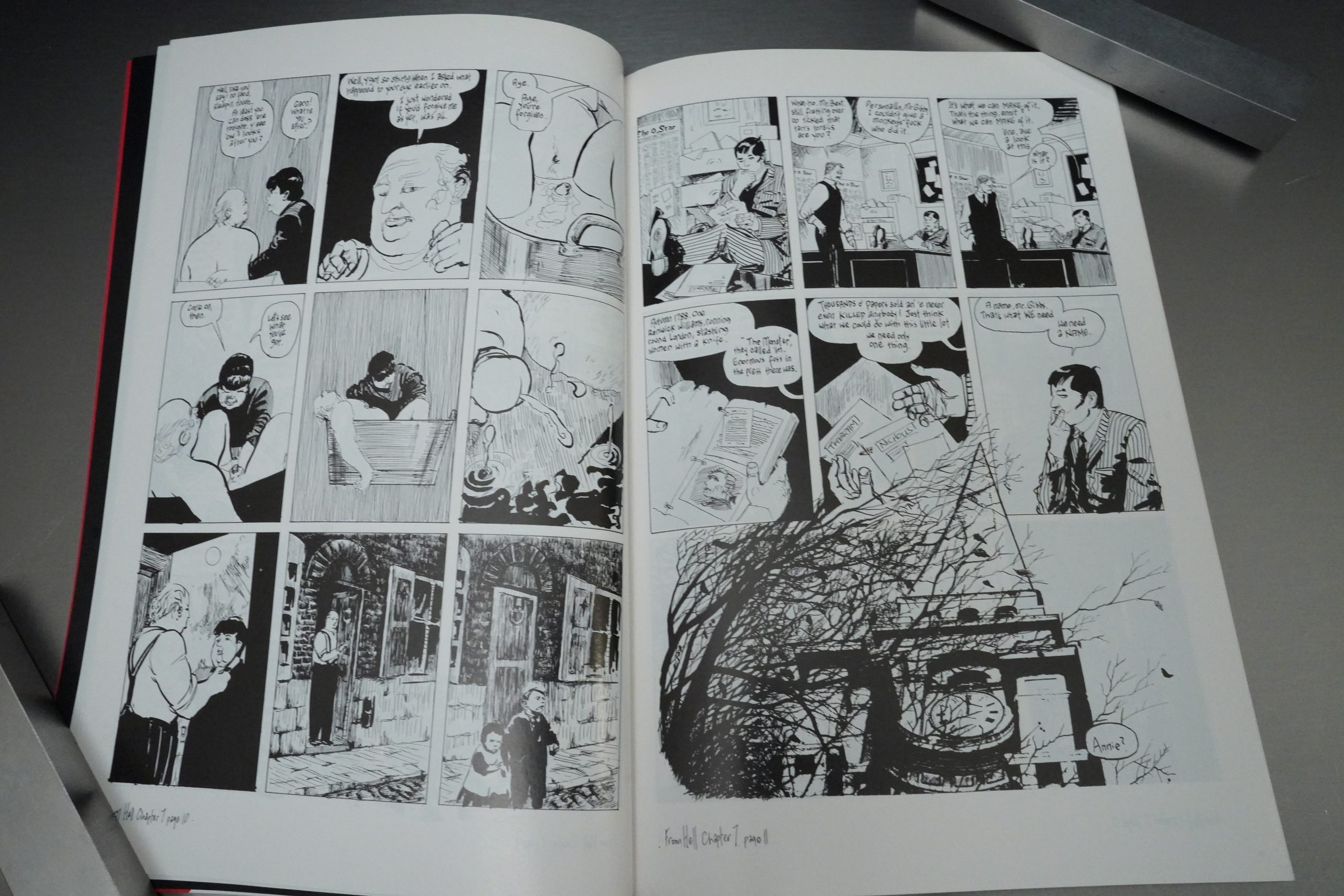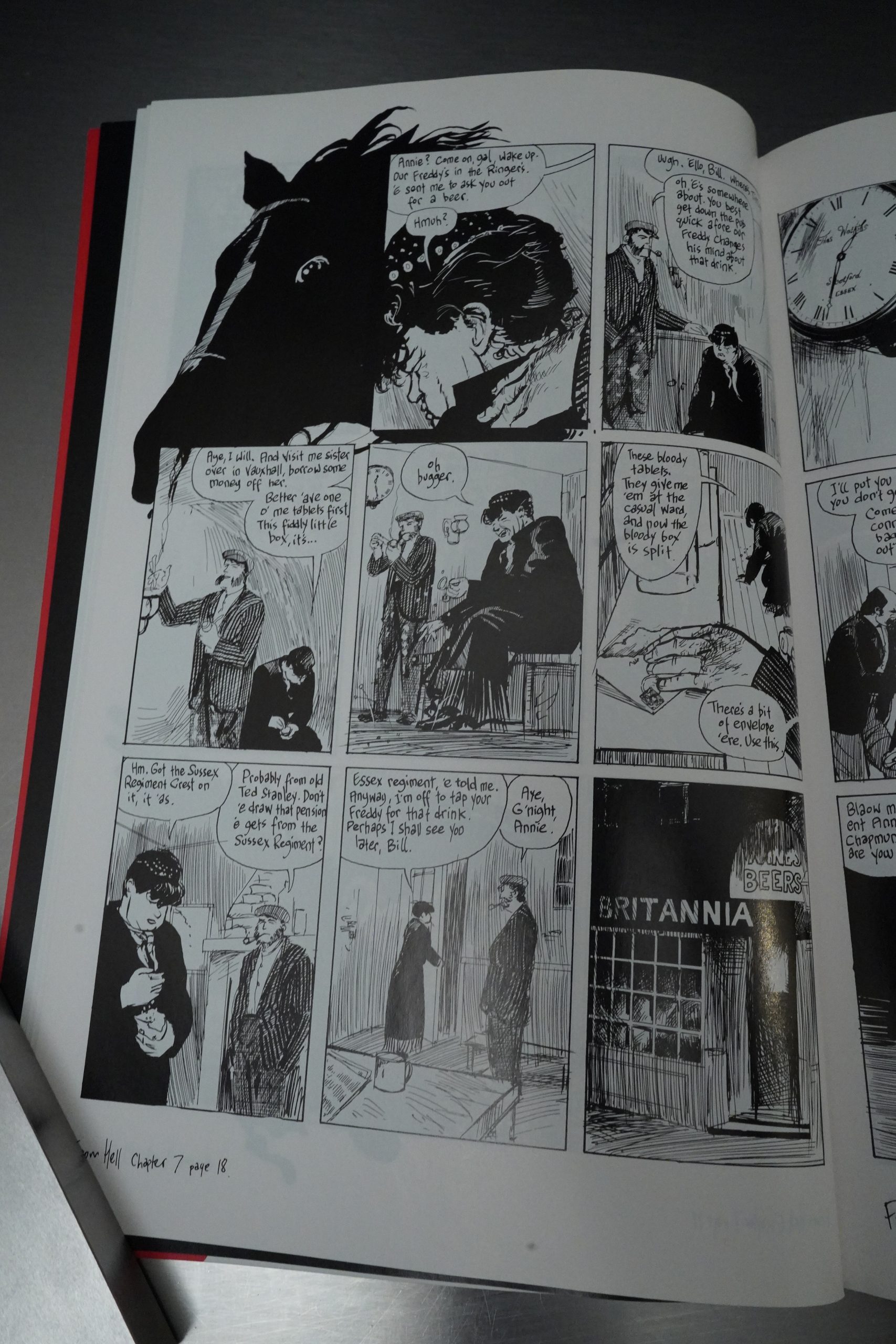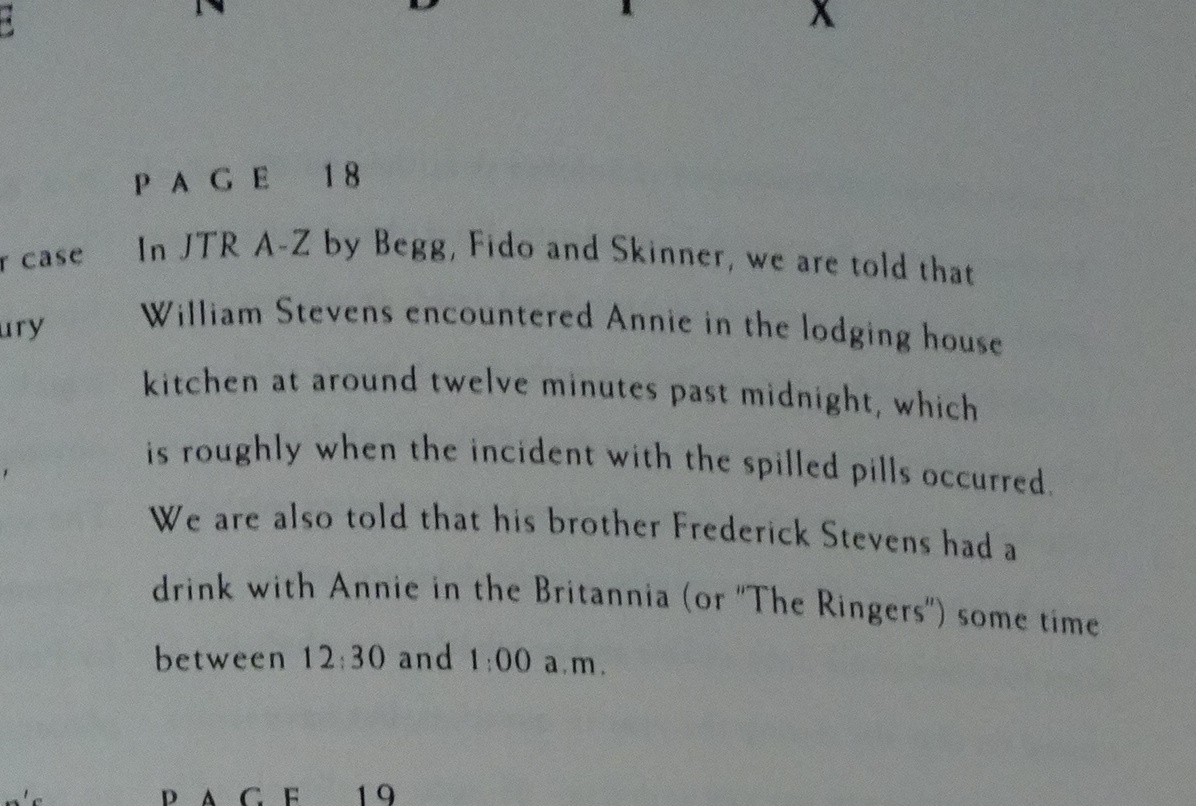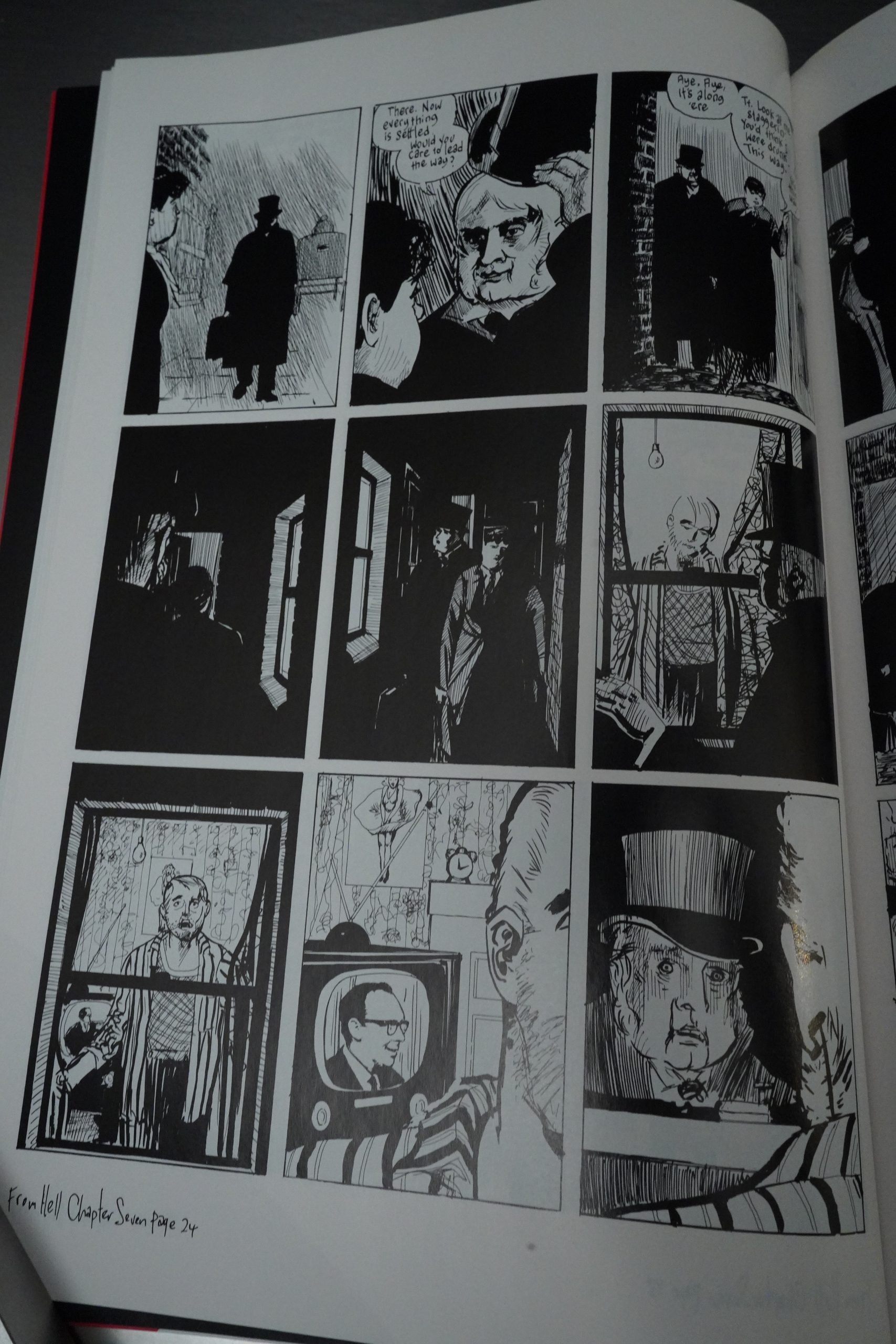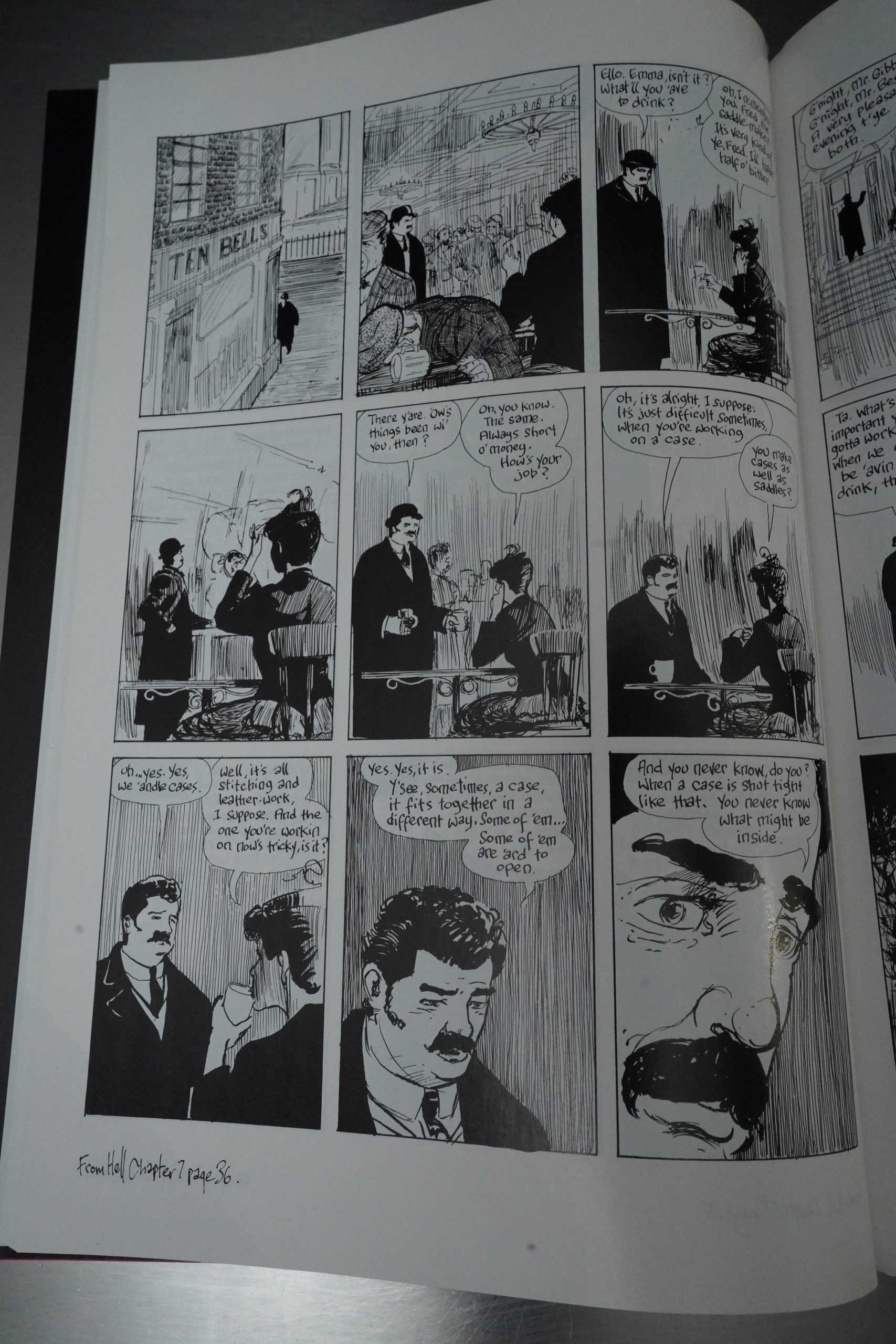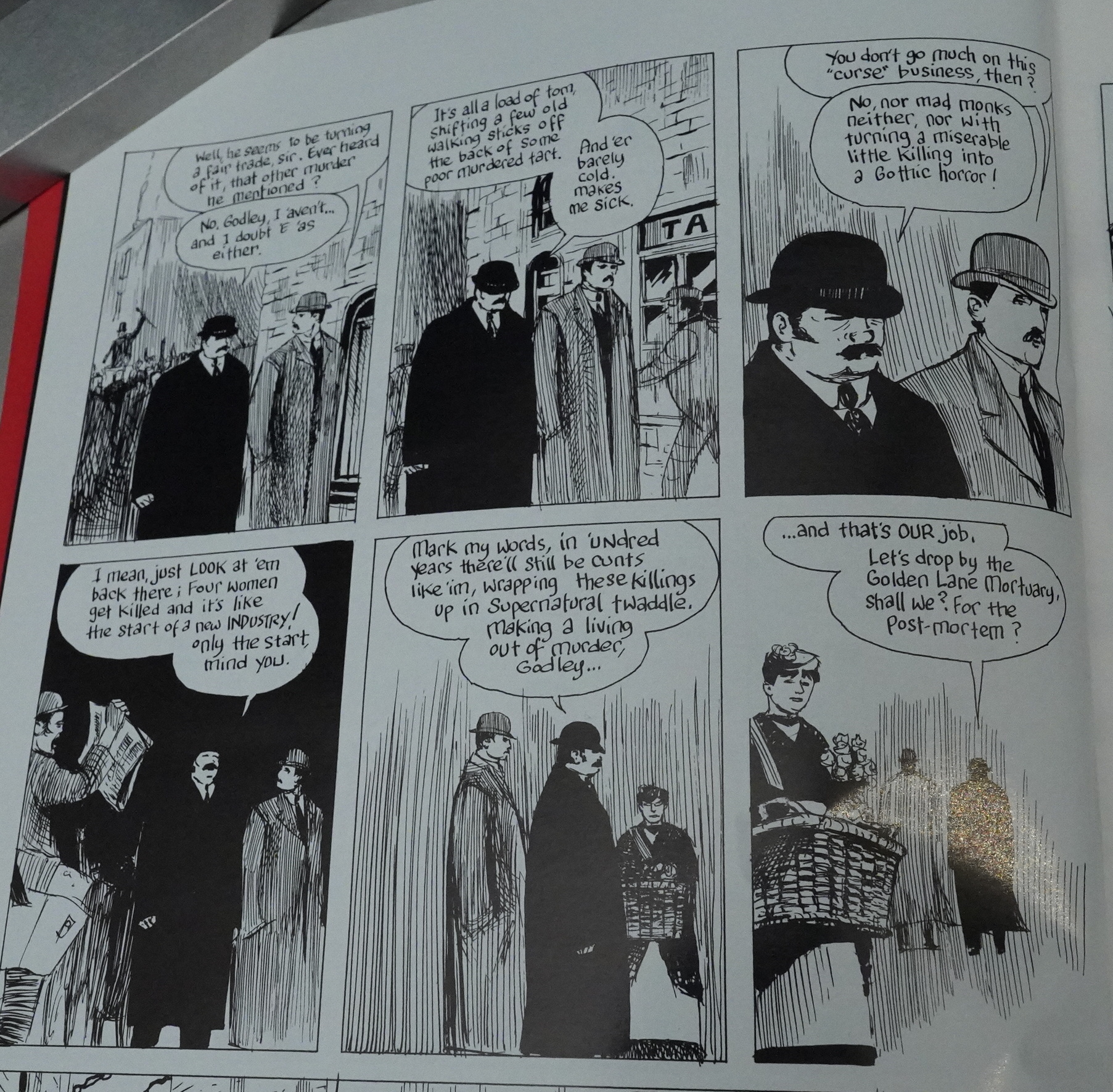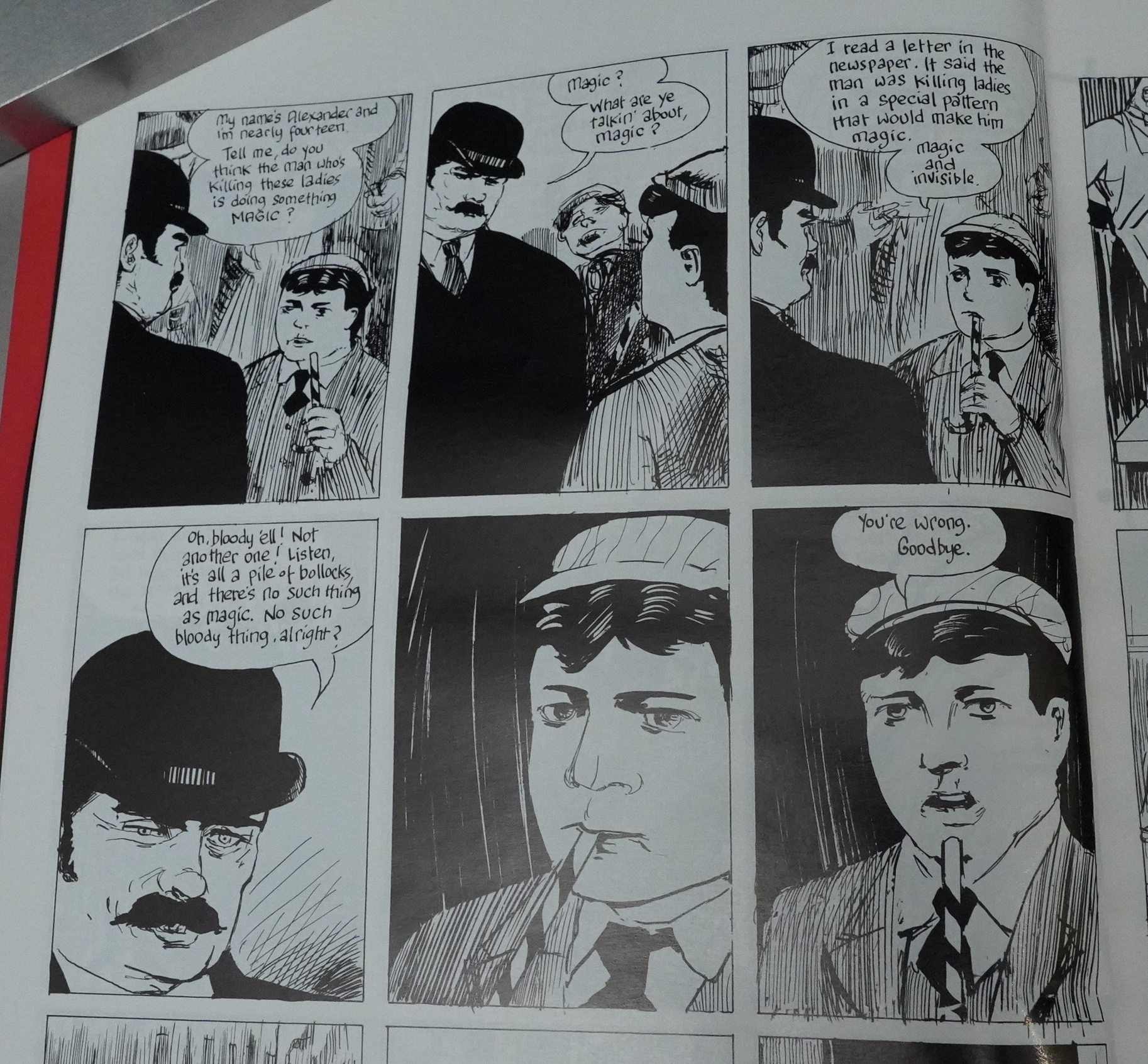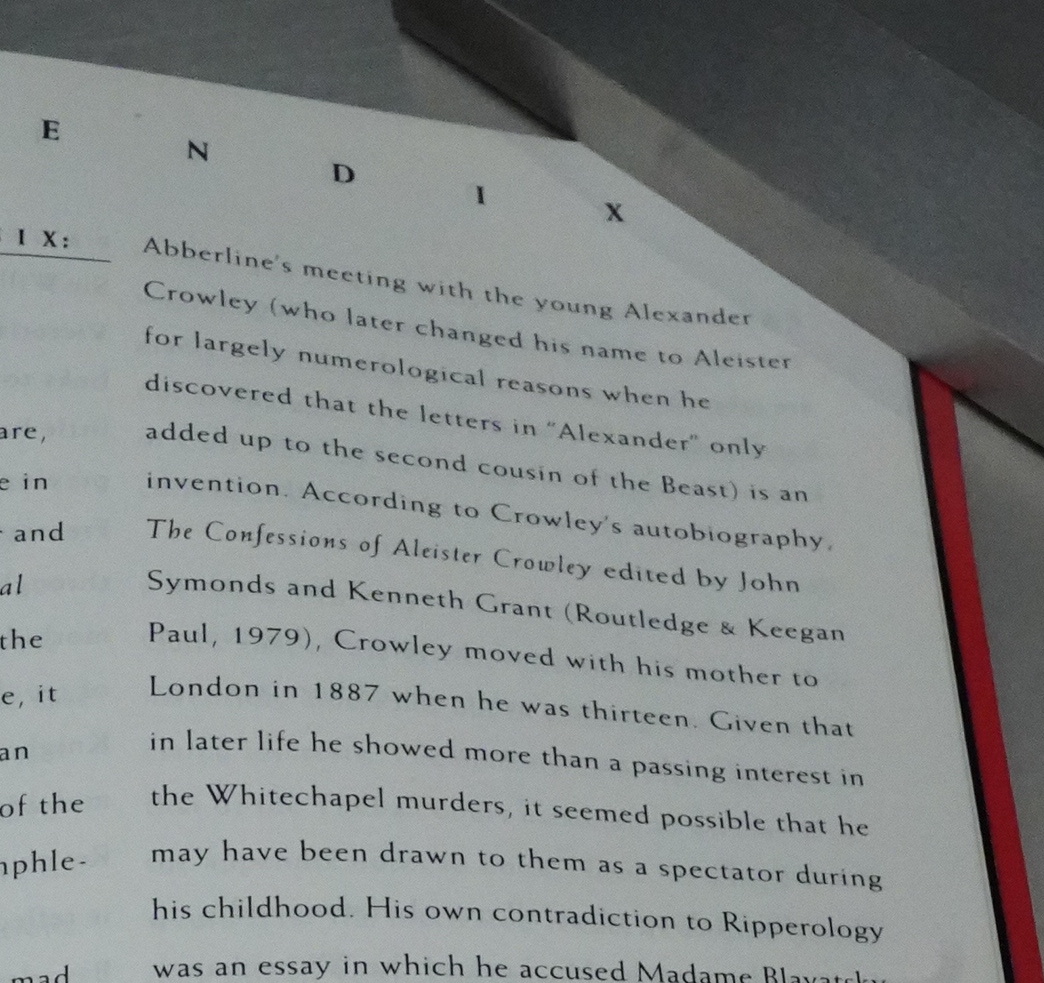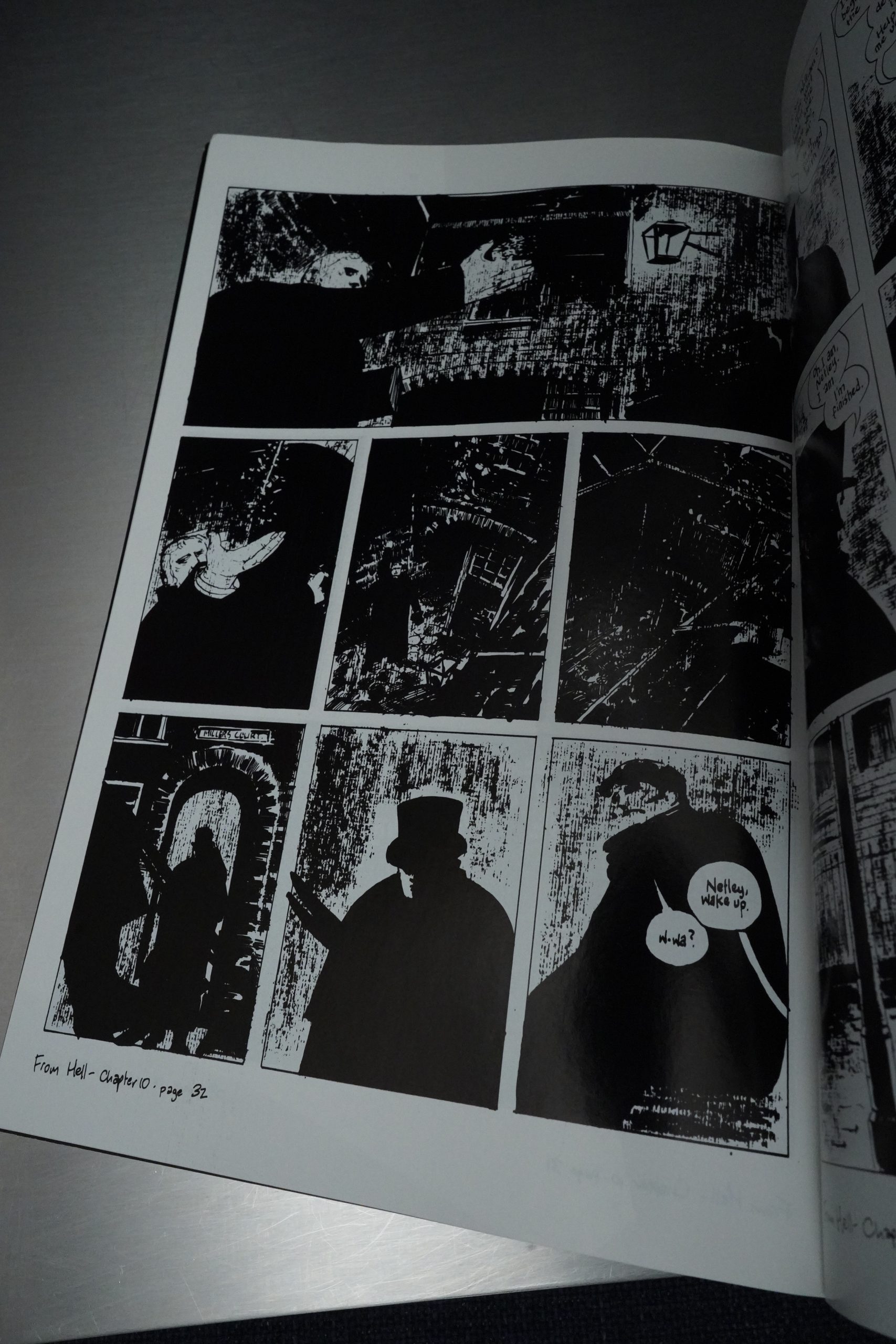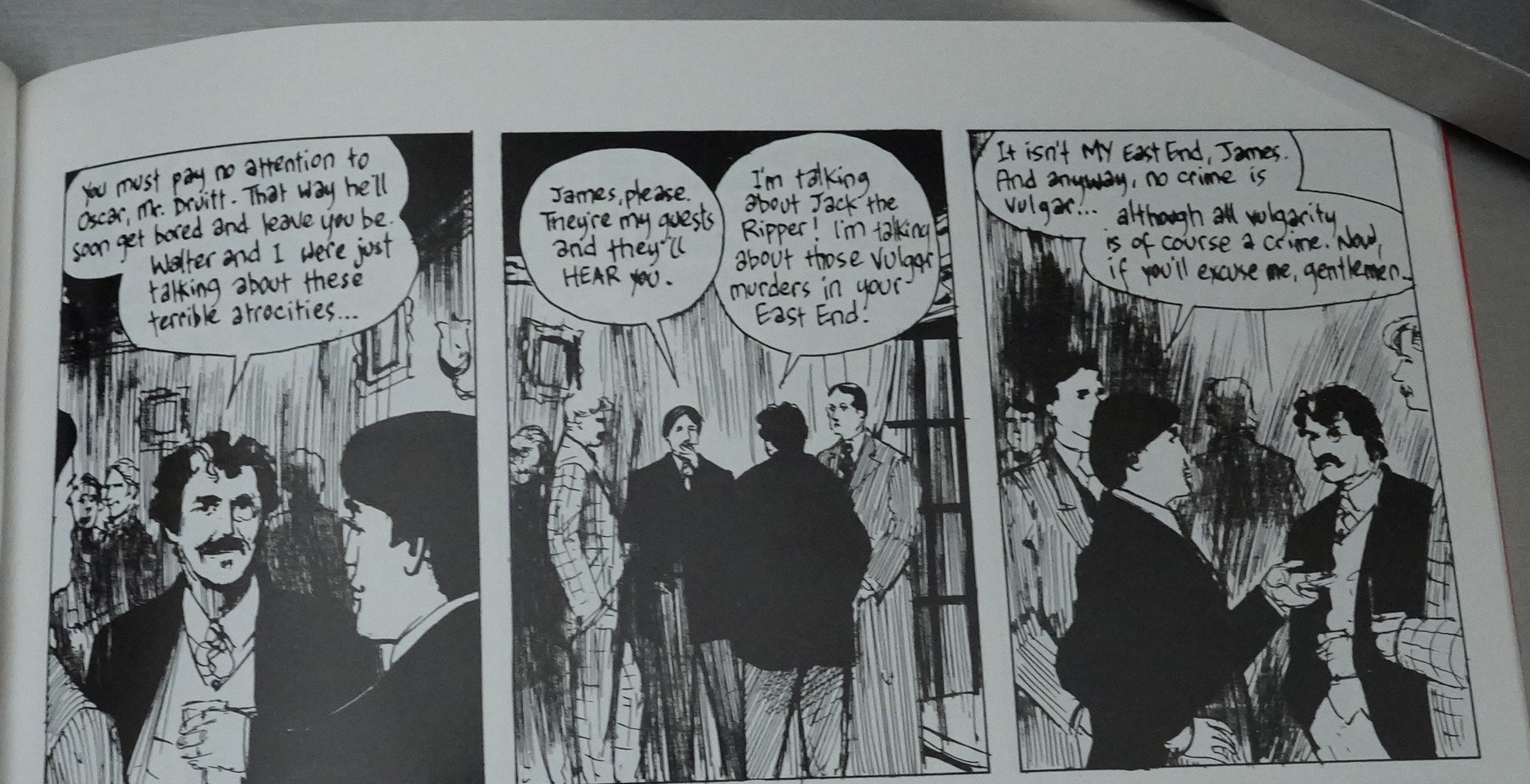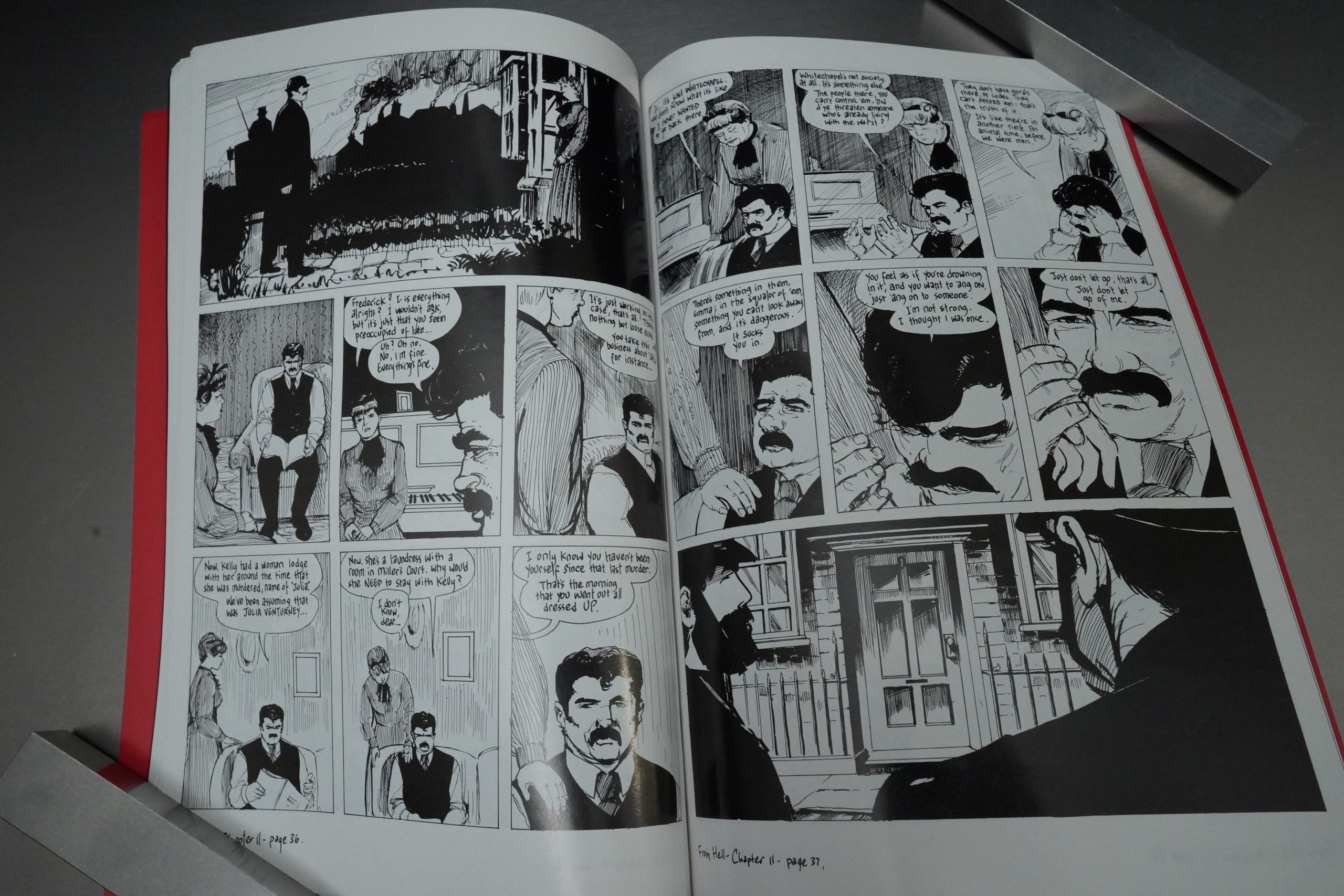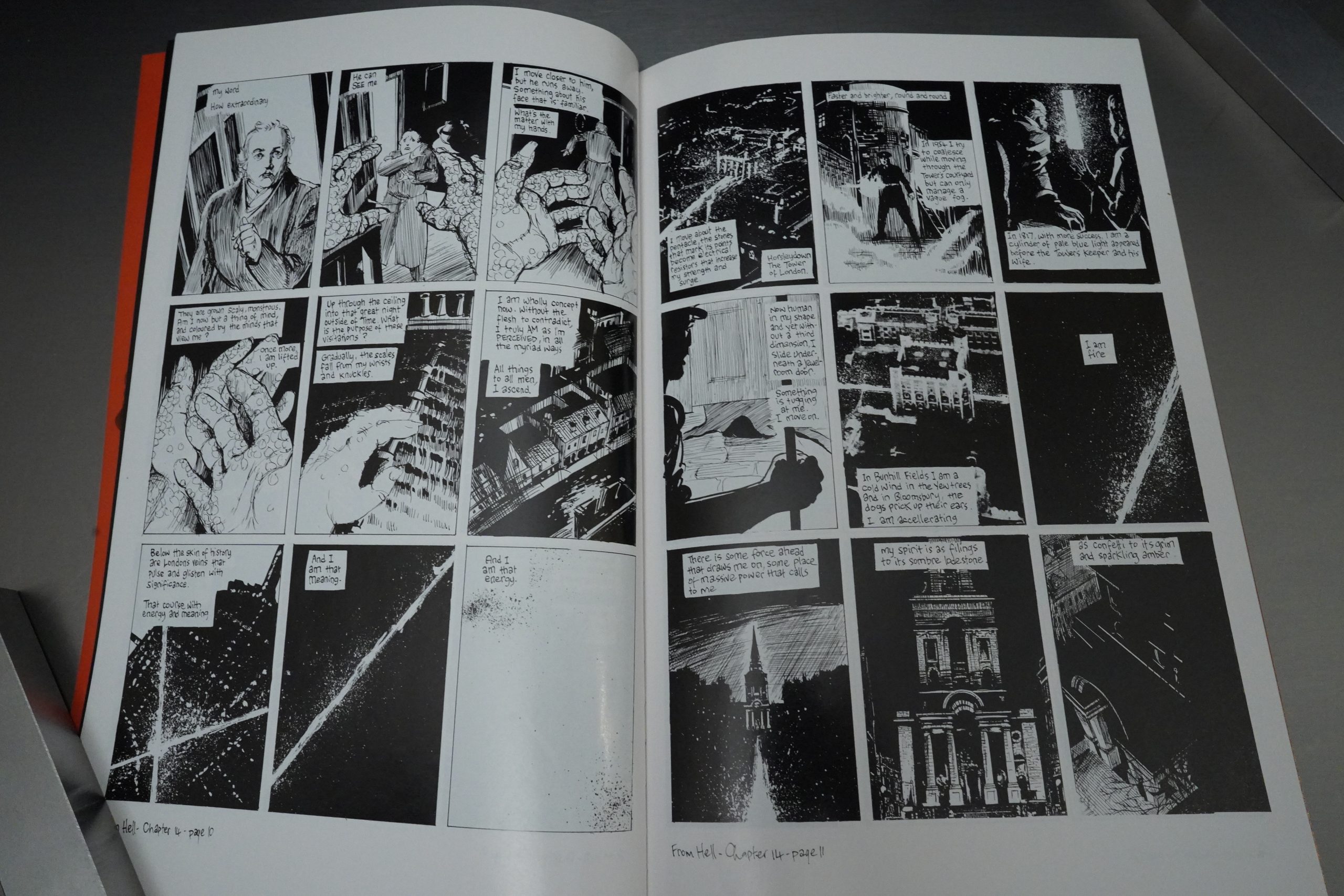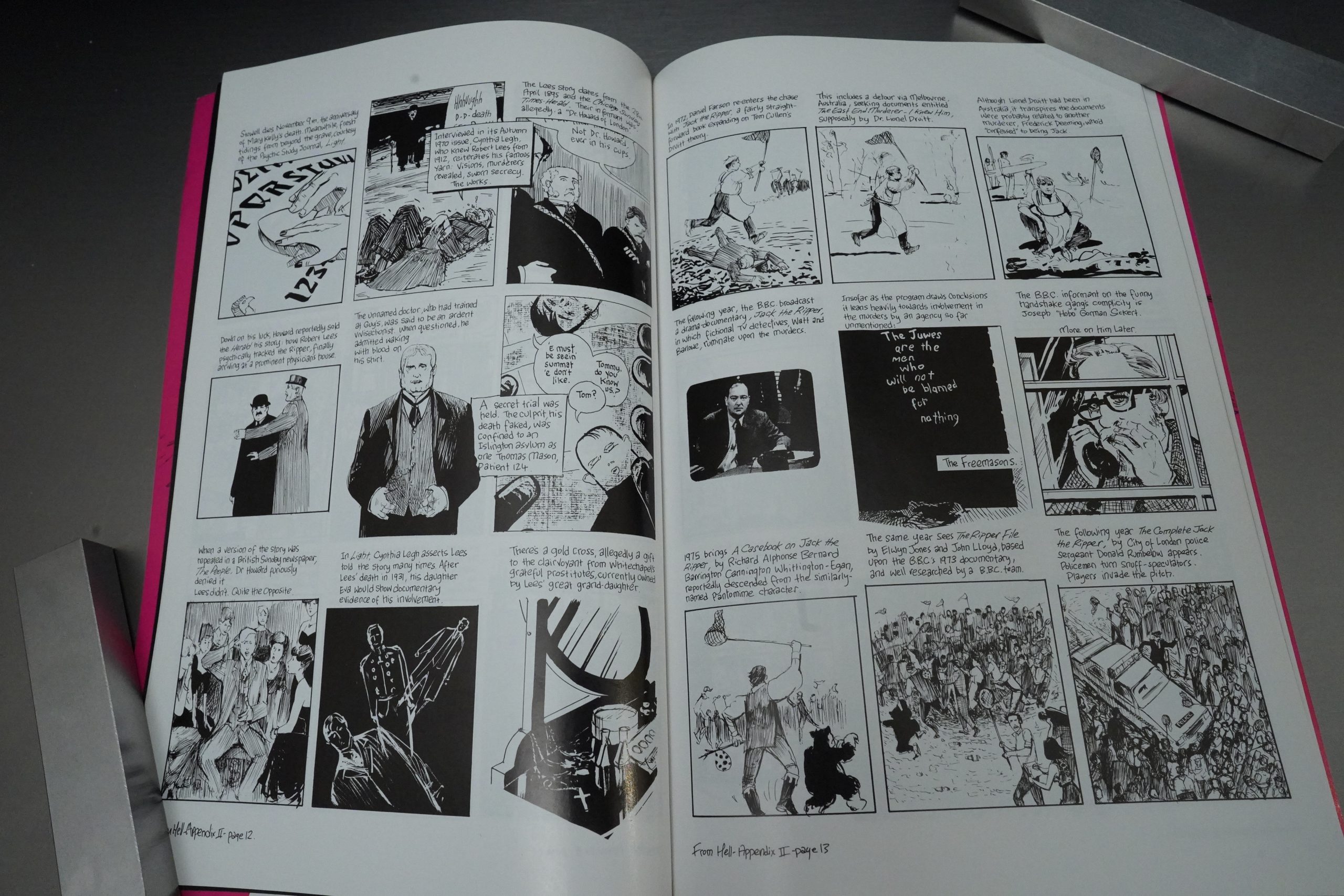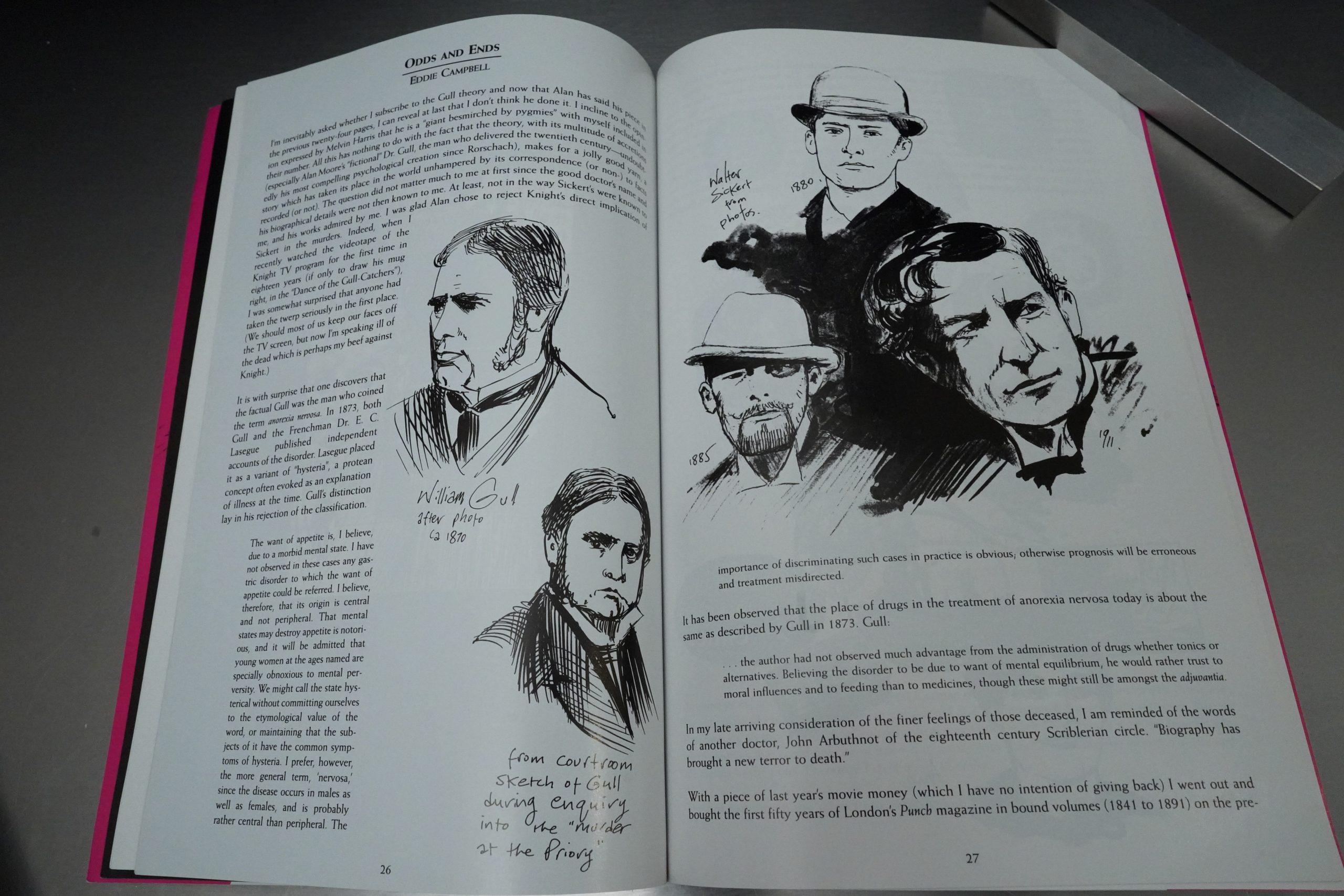From Hell (1998) #1-11 by Alan More and Eddie Campbell
What? “1998”? Didn’t Kitchen Sink start publishing this many years earlier?
Well, yes and no, and mostly yes. comics.org thinks that this is a 1998 book, because Kitchen Sink is the publisher of the 11th and final book, and that Mad Love is the publisher of the 10 first issues. But I’d say that is pretty misleading: First Tundra and then Kitchen Sink were the “associated” publishers formally. That is, the indicia said “Published by Mad Love in association with Tundra” etc. But as far as I can tell, Tundra/Kitchen Sink did all the publishing work, so it’s like eh. But I didn’t catch that earlier, so I’m doing this series under “1998”.
M’kay? M’KAY!?!
The nerve of some people…
Well, I covered the first few chapters while doing Taboo (where it was serialised originally), so I’m just lightly skimming the first tree issues here.
This is in the “prestige” format that was a signifier for all “serious” American comics from Dark Knight onwards.
And it’s printed on very shiny paper.
Alan Moore provides a lot of notes in the back of the books, and they’re arranged sensibly so that it’s easy to flip back and forth while reading (if you should so wish).
I wondered whether these were going to grow to epic proportions as the series progressed, but I think we get the longest notes in the second volume — at eight pages.
But I guess it makes sense that the earliest books have the most comments, since there’s a lot of introductionary material to get past, and then you can just refer back to this stuff in later issues.
Moore’s notes are quite entertaining — it’s filled with discussion about sources and stuff, of course, but there’s also quite a lot about what choices Moore is making, and some jokes here and there. That is, I can quite believe that somebody would almost prefer reading the notes to the actual comic. (If you’re actually interested in the subject matter, that is, which I am decidedly not.)
OK, here we go: After skimming through the first three issues (to re-familiarise myself after reading these a few weeks back when reading Taboo), I start reading the fourth issue.
Which (as I found out earlier to my great surprise) I had never read before. Back in the 90s, when I was a poor(ish) student, I naturally didn’t want to buy collections of stuff I already had, so I had the Taboo issues, and then I got the From Hell issues that had new material. Or so I thought, but when preparing for this blog, I found that I lacked issues #4, #5 and #11. So I’ve never actually read From Hell in its entirety before.
I know! I’m as shocked as you are!
And, as is often the case with a comic book that I’ve read out-of-sequence and incompletely before, most of the mysteries and ambiguities vanish when I finally get to read it in sequence. I’m finding myself oddly un-impressed sitting here now, reading this.
Moore has so many characters he wants to feature in this book, because it all “connects”, that it sometimes feels like I’m reading a plot recap, or a very involved daytime soap: Many short scenes where people show up, remind the viewer (I mean reader) who they are (by calling each other by their names, as people who talk to each other casually totally do in normal conversation), and then add a plot element, before a smash cut to the next scene where the same happens.
Perhaps that’s why Moore put “a melodrama” on the front covers?
There also a lot of stuff that seem like “here, I’m putting in something that connects; a clue!” like that woman noticing that the envelope she found having a Sussex regiment coat on it. What’s that about? So I flip to the notes:
And sometimes there is an explanation, and sometimes there isn’t. But this steady drop of mystery cookies that almost seem to demand that you flip to the notes is… pretty annoying, actually.
Oh yeah, in case you haven’t read From Hell (but why would you read this blog post if you hadn’t?) is about how this insane Masonic surgeon (with royal connections) is Jack the Ripper, and through his rituals, he ushers in the 20th century. Or something.
OOPS SPOILERS
Well, not really: The creators lay it all out, very didactically.
One thing that totally escaped my notice when I read From Hell in the 90s was how, well, melodramatic everything is. Isn’t that deep? Huh? Huh?
Moore (as he often does) try to invalidate any critique by giving his own critique of the work. “Supernatural twaddle” is a really sound way to sum it all up, though.
By far the most annoying and cloying thing Moore does is scenes like this. There is no dramatic sense to the cop talking to a random boy like this — he’s not seen before or after this — but it’s one of those Easter eggs wink wink nudge nudge. Who can Alexander be, huh?
Yes, it is Aleister Crowley, who might have been a gawker around those parts. And that adds so much more… er… uhm, actually, it adds jack shit.
Moore squeezes in all these cameos from famous people who were around at the time, and it adds nothing to the book. Perhaps some people find it amusing, though? “Look! A celebrity!”
The production on the book is pretty good. It makes sense to print it on shiny paper, because then you get really inky black inks, but on some pages, things go really awry and you get a lot of ink blotches.
It’s quite disturbing here and there. (And, yes, that’s a Oscar Wilde celebrity appearance, because why not.)
Again, I find myself being more negative when typing the blog than I was when I was reading the book. I guess it’s just more fun to write slightly snide remarks than say anything meaningful or appreciative.
So… Let’s see… Campbell’s artwork is really attractive. He tries a few different approaches over the years (which is natural), but it’s still pretty cohesive. He fortunately also had assistants, otherwise drawing all of this (more than 600 pages, I guess?) must have been a daunting task.
And it is an entertaining read, although all the woogie-woogie mystical things that mean a lot to Moore don’t mean anything to me, so while Moore is aiming for “whoa!” from the reader on many of the revelations, I’m sitting here going “so?”. He keeps the numerology to a minimum, at least.
It’s all very, very mystical.
The final issue is about the history of Ripperology. Moore uses the metaphor of people running around with butterfly nets, and as usual, he insists on it way beyond where it stops being amusing.
It’s pretty interesting, though.
Campbell weighs in, too, and poo-poos Moore’s solution for the villain. As one should, because it’s pretty ridiculous.
But makes for a pretty good story, anyway — which is what matters, after all.
The Comics Journal #142, page 46:
Alan is less shy; his new series, From
Hell, a collaboration with Eddie Campbell,
promises to treat the Jack the Ripper story as
never before —
and is already off to a
phenomenal start (after three chapters, compris-
ing 71 pages, Moore is still laying the ground-
work for the first murder). He is using all Of
Victorian London as his stage, and his players
include such secondary figures as the aural
surgeon/philosopher James Hinton, the “Ele-
phant Man” John Merrick, and Queen Victoria
herself. Apparently, Moore is going the Indict-
ment of Victorian Society route, and he’s going
it in a big way.
In From Hell (the title refers to the sarcastic
return address on the Ripper’s first letter to the
chairman of the Whitechapel Vigilance Com-
mittee), Moore strives to adhere to the facts as
we know them, while introducing several ac-
commodating fictional conceits, chiefly the one
— revealed in chapter three — that the Ripper’s
victims were not randomly chosen prostitutes
from among the nearly that walked the
streets of 1888 London. Rather, Moore intro-
duces them as longtime friends, and during the
course of the story they develop and even
stronger bond — that of co-conspirators.
Pressured into paying protection money to
a powerful East End street gang, they contrive
to raise the cash by the only means they can
think of: blackmail. Worse, it’s royal blackmail;
one of the women has first-hand knowledge of
a royal indiscretion of some magnitude, and she
attempts to put the squeeze on a disgraced, albeit
still loyal, royal retainer. It is this, we can guess
(we haven’t yet learned), that invites royalist
revenge in the form of the Ripper. (In From Hell,
the royal family is an insidious, tentacled force,
and the queen; contrary to her beloved modern
reputation;” is a tyrant — Grant Morrison’s
“mad, vicious bitch.”)[…]
An aura of conspiracy, invisible
authority, and ancient hierarchy begins to sur-
round Gull; as Moore’s Ripper, he Ls certainly
more than a killer; he is the full force of an evil
that can’t possibly be fought. It’s chilling.
It’s also thrilling. Moore is the Only comics
writer to show not just recognizable, but sub-
stantial, growth from project to project. In From
Hell, he recreates a lost world so completely
that even the complicated British caste system
is instantly decipherable; Moore knows, more
than anyone, the role dialect plays in determin-
ing class, and uses this to great effect. (His skill
with dialect is also one of the chief pleasures
of his other major work of the moment, Big
Numbers.) And his sense of irony — perhaps
the most finely honed of his fictional weapons,
and the most often wielded — is everywhere evi-
dent in From Hell, and is responsible for much
of the pleasure in this dark, disturbing work.
This is in part due to its understatement[…]
Reading it is
like reliving that trauma; it inflicts the same
wounds, on a personal level instead of a cultural
one. But what it also does is give us the means
to heal them. I urge you not to miss it.
writes in The Comics Journal #183, page 111:
In his 1990 disavowal of fame and fans in the Jåurnal,
Moore said, “I don’t see the writer’s job to be interacting
personally with the audience. It’s my work that interacts
with the audience.” But From Hell has it both ways. While
Moore now rarely presents himself to interviewers, where
his work might “interact” with his readers in a spirit of
critical exchange, his appendices and scripts see him
acting unhindered on his work’s behalf. The content of the
appendices, too, is significant. In their fascination with the
minutiae of a mythic and historical London, they show
Moore’ s desired contemporaries to be the likes of similarly
obsessed poet and novelist Iain Sinclair and the late thriller
master Derek Raymond, both Moore acquaintances — not
Frank Mi Iler. This is undoubtedly true. But neither of these
literary writers, in their equal seriousness, has felt com-
pelled to annotate their fiction (often, in Sinclair’s case,
fact-based) to the obsessive extent of Moore. From Hell
will stand with the work of any novelist. But the trappings
which surround it seem absurd, annoying. All the more so
when one remembers the script sample offered with rather
less ceremony in a recent Image comic by Moore — some
thumbnail sketches and a bit of dialogue.
The other direct cost to Moore of his spuming of
comics’ pop mainstream with From Hell is more obvious.
His readership has dwindled to an alarming degree. This
has been caused in part by choices which have already been
mentioned — his own idealism, which caused him to
secrete From Hell in Taboo, and the infrequent publication
which such choices encouraged. As Moore’s more prag-
matic friend Neil Gaiman, who continues to work for DC,
has noted, “I would much rather that [my publisher] were
efficient as opposed to something like the late Tundra
[From Hell’s second home], where the announced inten-
tion was incredibly ethical and friendly… But… there was
a level of disorganization… which made it very, very
difficult to deal with.” The problems of frequency which
damaged Big Numbers have reached an extreme with
From Hell. No one, not even Moore, knows when each
issue will appear. Few readers, apart from Moore fans who
already read comics, will be capable Of following such
incremental progress, looking hopefully intocomics shops
month after month, until a new issue miraculously ap-
pears. It is a publishing situation with few precedents. If
Dickens had thrown his readers chapters of The Old
Curiosity Shop when he was good and ready, taking the
1840s to get from one end to the other, his sales might have
suffered, too.
Edward Shannon writes in The Comics Journal #168, page 49:
A I-THOUGH IT IS OFTEN DIFFICULT
as a reasonably mature adult to recommend that
other reasonably mature adults sit and read a
comic book, sometimes a comic comes along
that makes much of the toil worthwhile. Alan
Moore and Eddie Campbell s From Hell, among
the finest and most accessible comic book work
currently being published, is doubly worth dis-.
cussing, as it aptly demonstrates both the best
and the worst qualities Of comics written for
mature audiences.[…]
The most recent installment, volume four,
continues the fine work we have come to expect
from this series. It also continues the curious
mystical touches that began with Mr. and Mrs.
Hitler’s appearance. Gull, whileescorting Annie
Chapman to her doom, looks into a window and
spies a middle-class twentieth century living
room, television and all. Moore explains this
and other confusing moments, like Gull’s hal-
lucinations and the Hitler family’ s appearance,
in his footnotes, but I can’t help thinking that
some of these digressions are just that: digres-
sions. After all, if the reader needs footnotes
just to follow the story (as opposed to filling in
interesting background notes), one questions
the efficiency of the script. But this is a minor
complaint, really; just five or six panels out of
what is apparently going to be a very long story
(From Hell is subtitled “a melodrama in sixteen
parts,” and with volume four, encompassing
chapters seven and eight, we top two hundred
pages). This volume also marks the beginning
Of Moore’s explanation of the famous letters
the London police of 1888 received, allegedly
from the Ripper himself. Moore lays the blame
at the feet of some enterprising journalists.
With this sub-plot, we get a fuller idea of the
metaphorical implications Moore means to give
to the Ripper killings as a sort of beginning for
so much of what’s bad about the twentieth
century.
Moore and Campbell demonstrate thatcom-
ics need only be limited by theircreators’ imagi-
nations. That these two men can create such a
profound fiction out of such well-worn material
as the Ripper murders is a testament to the
versatility and power of the comic book form.
The book is unsatisfying only in that it is unfin-
•ished, but it is so enthralling as to be well worth
the wait for future installments. Here is an
“alternative” comic that is alternative in the
truest sense of the word. In From Hell, we have
a departure from both adventure stories as well
as from the hip, ironic, iconoclastic humor of so
many other alternative books. From Hell’ s fas-
cination with the past pushes comics into the fu-
ture, and it is a book that comic fans can cherish
and that can bring non-comics readers to com-
ics. Go ahead, read it, but leave the lights on. •
The collected From Hell was a Book of the Year. Larry Rodman writes in The Comics Journal #220, page 19:
That said, I’m blindsided by this
great, fat, honking epic. It employs
the quintessential, tightly-wound con•
struction and recurring patterns that
Moore has been known for at least
since Watchmen. There’s never a slip
of control in terms of dramatic moti-
vation, which, among the numerous
supporting cast, is largely un derstated
for maximum effect. The astonish-
ing thing is, when you consider the
working length of the project, how
well the whole work hangs together
(When lesser serials would probably
at least betray some evolutionary fumbles in their
early Stages as compared to their climaxes). It’s not
that this book is great for a comic book; its strength
lies within its exploitation of the medium. Compel-
ling historical novels, which combine real and imag-
ined events— commenting on the past and present,
simultaneously—are not uncommon. GaryJennings
and Caleb Carr seem to knock them out without
breaking a sweat. But From Hell is from a different
phylum. Just about the only comments of any value
I can make have to do With how it appears to be
assembled.
Jeffrey Lang writes in Amazing Heroes #195, page 68:
Campbell’s art is wonderfully de-
tailed and he admirably captures and
enhances the details that- help the
reader realize what a peculiar mix of
the civilized and the barbaric the
Victorian era must have been, but this
is really Moore’s show. This isn’t
Swump Thing or Marvelman stuff—
isn’t beating the wer the
head with purple prose, but the lwe
of ‘*ord play and coincidence is still
evident. Two stand-out scenes are Dr.
Gull’s interview with John Merrick,
the so-called Elephant Man, and the
end of the 8-page prologue, “The Old
Man On the Shore,” in which retired
R)lice Inspector Fred Abberline and
“psychic” Robert Lees discuss their
shared history, teasing the reader with
tantalizing tidbits of horrors yet to
come. I.ÆS is overwhelmed by guilt,
but Abberline has been exhausted by
his compromises and all he has left
are his cynisism and his beachfront
home, “the house that Jack built.”
They are marvelous quick sketches,
and, if for no other reason, the reader
wants to read on to unearth the mean-
ing behind their statements. No other
writer in comics (or in any other
media) has Moore’s grasp of foreshad-
owing or can create such resonant
phrasings.
Though this is only the first volume,
the ground floor of the house that
Alan and Eddie are building, From
Hell may be one of the most com-
pelling narratives published this year.
That’s not just in comics, but in any
form. Don’t miss it.
Everybody loves it.
I confess that when I first obtained the complete original From Hell, I only read through it partially. While the artwork was impressive, too often it felt muddled and messy combined with the excruciating levels of gore and Moore’s legendarily dense layers of text.
(That new edition of From Hell looks absolutely horrifying. And not in a good way — what on Earth was Campbell thinking?)
Hm:
Maybe don’t recommend this to your mother, but definitely give it a read yourself. It’s an intimately touching story of those who don’t dare dream of getting ahead in this life and of one who is doggedly determined to transcend it.
This is the two hundred and ninth post in the Entire Kitchen Sink blog series.
